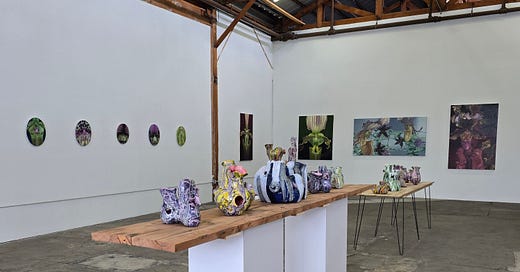Your brain is a liar.
Not maliciously. But it lies nonetheless, especially when it comes to making art. It tells you you're not ready. It whispers that your work isn't good enough. It screams that you should wait until inspiration strikes, until you have more time, until the conditions are perfect.
I'm writing this because I need to follow my own advice. I have a hard time with this too.
Contrary action—a tool from 12-step recovery—cuts through these lies with surgical precision.
What Contrary Action Actually Is
Contrary action means doing the opposite of what your impulses demand. When every cell in your body says "retreat," you advance. When your thoughts spiral toward "I can't," you pick up your tools anyway.
This isn't toxic positivity or forcing yourself through genuine exhaustion. It's recognizing the difference between authentic needs and the voice of resistance masquerading as wisdom.
In recovery, contrary action looks like calling a friend when you want to isolate, or going to a meeting when you want to stay home. For artists, it's picking up the brush when perfectionism tells you to wait.
The Artist's Brain on Creative Resistance
Creative resistance speaks fluent rationalization. It sounds reasonable:
"I need to research more first." "This isn't the right project to start with." "I should practice fundamentals before attempting anything real." "Other people are already doing this better."
These thoughts feel protective. They feel smart. They're actually terror dressed up as logic.
Your creative self knows the difference. Contrary action trusts that knowing over the noise.
Practical Contrary Actions for Artists
When Perfectionism Paralysis Hits
The lie: "It won't be good enough." Contrary action: Set a timer for 15 minutes. Make something intentionally imperfect. Post it somewhere. Delete it later if you want, but let it exist first.
When Comparison Crushes You
The lie: "Everyone else is further ahead." Contrary action: Unfollow accounts that trigger comparison spirals. Follow three artists whose work you don't understand yet—let curiosity replace competition.
When Rejection Stings
The lie: "See? You're not cut out for this." Contrary action: Submit to something else within 48 hours. Apply for that residency. Send that pitch. Let momentum carry you past the sting.
When Creative Block Feels Permanent
The lie: "You've lost it. The ideas are gone." Contrary action: Show up to your workspace anyway. Sit there. Move your hands. Trust that showing up is 80% of the work.
When Impostor Syndrome Screams
The lie: "You don't belong in creative spaces." Contrary action: Introduce yourself to one new artist this week. Comment genuinely on someone's work. Claim your space in the conversation.
When Fear of Visibility Wins
The lie: "Better to stay small and safe." Contrary action: Share something you made this week. Tag it properly. Let people find it.
Making Contrary Action Sustainable
Start ridiculously small. If your impulse is to avoid the studio entirely, contrary action might just be walking into the room. If perfectionism keeps you from sharing work, contrary action could be showing one piece to one trusted person.
The goal isn't to become fearless. It's to act while afraid.
Notice the pattern: resistance speaks first and loudest. It always has reasonable-sounding arguments. Contrary action interrupts that pattern by choosing behavior over feelings.
Your Creative Practice Needs This
Every artist battles these internal voices. The difference between those who keep making work and those who don't isn't talent or inspiration—it's willingness to act contrary to the brain's protective but limiting impulses.
Your art doesn't need perfect conditions. It needs you to show up despite imperfect ones.
The resistance will never fully disappear. But you can stop letting it make your decisions.
This Week's Challenge
Pick one area where creative resistance runs your life. Choose the smallest possible contrary action. Do it three times this week.
Don't wait until you feel ready. That's the whole point.
The beautiful thing about contrary action? It works whether you believe in it or not. Your brain will catch up to your behavior, not the other way around.
Gary Brewer at Wonzimer PC Kristine Schomaker





